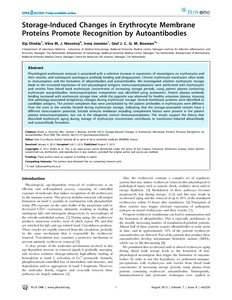Dinkla, S; Novotný, VM; Joosten, I; Bosman, GJ
(2012)
Storage-induced changes in erythrocyte membrane proteins promote recognition by autoantibodies.
PLoS ONE, 7 (8).
e42250 -e42250 (9).
ISSN 1932-6203
https://doi.org/10.1371/journal.pone.0042250
SGUL Authors: Dinkla, Sip
![[img]](https://openaccess.sgul.ac.uk/103731/1.hassmallThumbnailVersion/pone.0042250.pdf)  Preview |
|
["document_typename_application/pdf; charset=binary" not defined]
Published Version
Download (517kB)
| Preview
|
Abstract
Physiological erythrocyte removal is associated with a selective increase in expression of neoantigens on erythrocytes and their vesicles, and subsequent autologous antibody binding and phagocytosis. Chronic erythrocyte transfusion often leads to immunization and the formation of alloantibodies and autoantibodies. We investigated whether erythrocyte storage leads to the increased expression of non-physiological antigens. Immunoprecipitations were performed with erythrocytes and vesicles from blood bank erythrocyte concentrates of increasing storage periods, using patient plasma containing erythrocyte autoantibodies. Immunoprecipitate composition was identified using proteomics. Patient plasma antibody binding increased with erythrocyte storage time, while the opposite was observed for healthy volunteer plasma, showing that pathology-associated antigenicity changes during erythrocyte storage. Several membrane proteins were identified as candidate antigens. The protein complexes that were precipitated by the patient antibodies in erythrocytes were different from the ones in the vesicles formed during erythrocyte storage, indicating that the storage-associated vesicles have a different immunization potential. Soluble immune mediators including complement factors were present in the patient plasma immunoprecipitates, but not in the allogeneic control immunoprecipitates. The results support the theory that disturbed erythrocyte aging during storage of erythrocyte concentrates contributes to transfusion-induced alloantibody and autoantibody formation.
| Item Type: |
Article
|
| Additional Information: |
This is an open-access article distributed under the terms of the Creative Commons Attribution License, which permits unrestricted use, distribution, and reproduction in any medium, provided the original author and source are credited. |
| Keywords: |
Autoantibodies, Biotinylation, Blood Preservation, Blood Transfusion, Cytoplasmic Vesicles, Epitopes, Erythrocyte Membrane, Humans, Immunoprecipitation, Membrane Proteins, Proteomics, Time Factors |
| SGUL Research Institute / Research Centre: |
Academic Structure > Molecular and Clinical Sciences Research Institute (MCS)
Academic Structure > Molecular and Clinical Sciences Research Institute (MCS) > Cardiac (INCCCA) |
| Journal or Publication Title: |
PLoS ONE |
| ISSN: |
1932-6203 |
| Related URLs: |
|
| PubMed ID: |
22879923 |
| Web of Science ID: |
22879923 |
| Dates: |
| Date |
Event |
| 2012-08-03 |
Published |
|
  |
Download EPMC Full text (PDF)
|
 |
Download EPMC Full text (HTML)
|
 |
Go to PubMed abstract |
| URI: |
https://openaccess.sgul.ac.uk/id/eprint/103731 |
| Publisher's version: |
https://doi.org/10.1371/journal.pone.0042250 |
Statistics
Item downloaded times since 26 Mar 2014.
Actions (login required)
 |
Edit Item |




